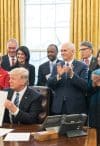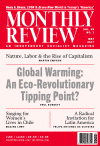Americas

Since Trump’s election, mainstream commentary has generally avoided the question of fascism or neofascism, preferring instead to apply the vaguer, safer notion of “populism.” In today’s political context, however, it is crucial to understand not only how the failures of neoliberalism give rise to neofascist movements, but also to connect these to the structural crisis of concentrated, financialized, and globalized capitalism. | more…

Consider the child with curly brown / hair sleeping with her dog in the back / of an old SUV while her parents doze / in scruffy front seats tilted back.…
Marge Piercy is the author of many books of poetry, most recently
Made in Detroit.

What can a class analysis tell us about fascism’s national particularities and early forms? Why was there no mass movement for a separate fascist party in the United States? The lessons of several now-forgotten works of scholarship from the 1930s are critical to our understanding of American fascism—not only for what they tell us about its history, but also about how to fight it today. | more…

The Return of Neoliberalism in Argentina
Argentina has long been plagued by cycles of economic mismanagement, including multiple failed neoliberal experiments. Before his election as president, Mauricio Macri promised resumed growth, an export boom, lower inflation, a smaller budget deficit, and less poverty. Since then, has the new neoliberalism outperformed the old? | more…

Did the accreditation crisis and subsequent labor struggle at City College of San Francisco represent a failure of union democracy, or a hard-won victory against corporate education reform? Rick Baum’s recent article on this question, “A Teachers Union Against Itself” (published the April 2017 issue of Monthly Review) prompted a lively response from AFT Local 2121 members and supporters. This correspondence article collects their letters, as well as a reply by Baum. | more…

In 2014, after years of grassroots organizing, a coalition of progressives transformed Richmond, California into the largest city in the United States governed by a Green Party mayor. But Richmond is not just Anytown: its economy and government has been dominated for a century by a giant Chevron refinery, and by a racist political machine determined to keep the city’s working-class and nonwhite majority out of power. | more…

U.S. immigration has been the subject of furious debates for decades. On one side, politicians and the media talk about aliens and criminals, with calls to “deport them all.” On the other side, some advocates idealize immigrants and gloss over problems associated with immigration. Dialogue becomes possible when we dig deeper and ask tough questions: Why are people in other countries leaving their homes and coming here? What does it mean to be “illegal”? How do immigration raids, prisons, and border walls impact communities? Who suffers and who profits from our current system—and what would happen if we transformed it? | more…

The fact that alt-right figures are playing key roles in the Trump administration, while circumventing the Senate confirmation process, is an ominous indication of the wider effort by the administration to construct a new political order, further concentrating power in the White House and bringing the rest of the state into line. | more…

Rethinking 1984 and Brave New World
With the rise of Donald Trump, U.S. politics has descended, like never before, into a theater of the absurd. Unbridled anti-intellectualism, deception, and “vindictive chaos” recall a morally reprehensible past in the guise of “making America great again.” But despite his populist posturing, Trump’s contempt for democratic processes is matched by his commitment to economic policies that favor the financial elite. | more…

Capitalism was a radical break with the past: for the first time, production of basic goods was driven by the accumulation of wealth for its own sake, and not primarily to satisfy human needs. Likewise, we are alienated from the natural world, as the products of our own labor are no longer under our control. Our very perception of nature is shaped by an economic system that treats “the environment” as a collection of commodities to be exploited. | more…

The Legacy of Andre Gunder Frank's 'Development of Underdevelopment'
Admired, followed, criticized, denounced, and rediscovered, “The Development of Underdevelopment” deserves a place among the key documents of postwar radical political economy. More than fifty years on, its ideas still illuminate aspects of recent struggles and shortcomings among left-of-center governments in Latin America. Most importantly, Frank’s work poses a bold postcolonial challenge that has yet to be fully met by Latin American scholars and social movements. | more…

In an idyllic canyon near Santiago, a group of twelve women were electric with emotion from sharing personal stories and experiences, and, of course, from singing. Deep bonds were forged among participants, few of whom knew each other prior to the workshop. They were there to compose women-identified songs in a setting that alternated between individual and group composition. | more…











